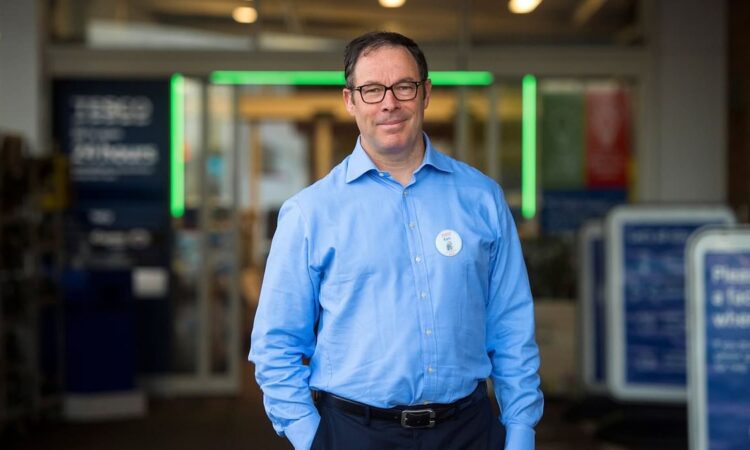
- Tesco’s adjusted annual profit came in at over £2.8bn, new results show
- Shoppers buying posh nosh as Tesco’s Finest range sales exceed £2bn
Tesco profits soared last year after inflation in the grocery sector ‘lessened substantially’ and consumer confidence improved.
The UK’s biggest supermarket group posted a retail adjusted operating profit – its preferred measure of profitability – of £2.76billion for the year to February, up 11 per cent.
The chain’s total annual revenue, excluding VAT, rose 4.4 per cent to £68.2billion for the year.
Tesco said retail like-for-like sales grew by 6.8 per cent for the year, as it benefited from a return to volume growth in the UK and Ireland in the second half of the year, and easing price inflation led shoppers to buy more products.
This offset a 17.2 per cent drop in fuel sales driven by falling petrol and diesel prices.
Tesco boss Ken Murphy said price rises were not a ‘material factor’ for the supermarket, adding that ‘our business is in really good shape’.
‘I see price inflation stabilising’ in the coming months, he added in a media call.
Murphy said around 70 per cent of transactions in Tesco were completed using a Clubcard, with the group boasting ‘over 22m Clubcard households in UK’.
‘The Clubcard is hugely valued by customers’, Murphy added.
Related Articles
HOW THIS IS MONEY CAN HELP
He said: ‘We have a compelling platform that has worked well and will continue to do so.’
In its preliminary annual results, Tesco said there were around 8,000 ‘exclusive Clubcard Prices deals each week’ over the course of the year.
Tesco is to drop the blue and yellow logo used to promote its Clubcard loyalty scheme, a rebrand that could cost it ‘mid to high single million digits’, after losing an appeal against a ruling that it had copied a design by Lidl.
In November, it was revealed that Tesco’s Clubcard and Sainsbury’s Nectar Prices were to be scrutinised by the UK’s competition watchdog in a probe into supermarket loyalty schemes.
Tesco is looking to cut costs further this year, focusing on areas like warehousing, distribution and energy consumption. It remains unclear whether any job losses are on the cards.
In its latest results, Tesco told shareholders it saw growth supported by investment to improve value, with the retailer cutting prices on around 4,000 products over the year.
The supermarket chain is among a number of grocers investing heavily in price improvements amid strong competition from German discount brands Aldi and Lidl.
Tesco benefited from consumers looking to save money by cooking and entertaining at home rather than dining out, with sales of its ‘Finest’ premium range up 15.7 per cent in the year. Finest sales exceeded £2billion for the period.
Murphy said: ‘Customers are choosing to shop more at Tesco, which is reflected in growing market share as they respond to the improvements we’ve made to the value and quality of our products.
‘Inflationary pressures have lessened substantially; however, we are conscious that things are still difficult for many customers, so we have worked hard to reduce prices and have now been the cheapest full-line grocer for well over a year.’
Murphy said Tesco was ‘paying considerably more tax than a few years ago, which we think is a good thing.’
The supermarket group has a 27.3 per cent share of Britain’s grocery market, up 40 basis points on the year.
Looking ahead, Tesco forecast retail adjusted operating profit, its key profit measure, of ‘at least’ £2.8billion for its 2024/25 year.
The group said it would buy back a further £1billion worth of shares over the next year, having already purchased £1.8billion since October 2021.
Richard Hunter, head of markets at Interactive Investor, said: ‘Tesco has again cemented its position as the pre-eminent grocer of the British aisles, driven by a relentless focus on both value and quality.’
He added: ‘Given its position, it can be difficult for the group to continue to exceed expectations, but Tesco is showing few signs of fatigue as its presence weighs heavily on competitors.
‘The share price has seen an increase of 9 per cent over the last year, as compared to a gain of 1.9 per cent for the wider FTSE 100 and the new buyback programme should additionally be price supportive as it rolls out.
‘In the meantime, the group’s longstanding position as the preferred play in the sector seems assured, with the market consensus of the shares as a strong buy highly likely to remain intact.’
Tesco shares rose 0.9 per cent or 2.6p to 290.10p, having risen over 8 per cent in the last year.
Some links in this article may be affiliate links. If you click on them we may earn a small commission. That helps us fund This Is Money, and keep it free to use. We do not write articles to promote products. We do not allow any commercial relationship to affect our editorial independence.






